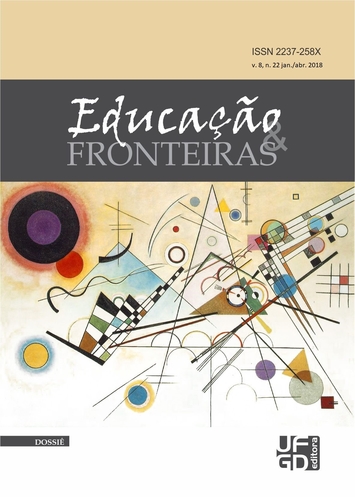Indigenous people in the basic education schools of Mexico City
DOI:
https://doi.org/10.30612/eduf.v8i22.9045Keywords:
Education. Indigenous. Inclusion.Abstract
This article analyzes the double effect caused by intercultural practice in elementary schools in Mexico City, where children of indigenous origin are treated. Where, on the one hand, this practice elaborates alternatives for the implementation of school justice and, thus, allows indigenous students to participate in school decisions and, on the other, segregates and, consequently, reinforces the exclusion of students. The analysis starts from the assumption that the intercultural practice promoted by the EIB triggers a complex process of the a) recognition of indigenous and non-indigenous identity; b) the reinvention of the students' indigenous identity; and c) the construction of a pedagogy of indigenous cultures. It is the result of a collaborative research carried out in 15 elementary schools in Mexico City, whose main objective is to promote bilingualism among indigenous students and interculturality. The reflection leads me to conclude that the approach of bilingual intercultural education promoted by the PEIBDF in these schools, institutes policies of inclusion and, paradoxically, encourages ethnic segregation.Downloads
References
BESALÚ, X. Diversidad y educación. Madrid: Editorial Síntesis, 2002. (Colleción Teoría e Historia de la Educación.)
BOURDIEU, P. y PASSERON, C. La reproducción. Elementos para una teoría del sistema de enseñanza. México: Fontamara, 1996.
GELNER, E. Cultura, identidad y política. El nacionalismo y los nuevos cambios sociales. Barcelona: Gedisa, 1989.
HARGREAVES, A. Profesorado, cultura y posmodernidad (cambian los tiempos, cambia el profesorado).Madrid: Moratta, 2003.
KYMLICKA, W. Ciudadanía multicultural: una teoría liberal de los derechos de las minorías. Barcelona: Paidós, 1996.
KYMLICKA, W. La política vernácula. Nacionalismo, multiculturalismo y ciudadanía. Barcelona: Paidós, 2003.
MIGUEZ, M.P. Nunca es tarde para comenzar. Bilingüismo indígena y enseñanza bilingüe en primaria. En: Teresinha Bertussi y G. González (Coord.). Anuario educativo mexicano. México: UPN/Porrúa Hermanos, 2007. p. 95-115.
REBOLLEDO, N. Antropología y educación intercultural. Perspectivas interdisciplinarias. En: Mechthild Rutsch y Mette Wacher (Coord.). Alarifes, Amanuenses y Evangelistas. Tradiciones, personajes, comunidades y narrativas de la ciencia en México. México: Instituto Nacional de Antropología e Historia/Universidad Iberoamericana, 2004. p. 397-418. (Colección Científica, Serie Antropología.)
REBOLLEDO, N. Educación interrumpida. Un caso de migración y bilingüismo en la ciudad de México. México: Ediciones de la Universidad Pedagógica Nacional, 2007. (Colección Más Textos.)
SCHÖN, D. La formación de profesionales reflexivos. Hacia un nuevo diseño de la enseñanza y el aprendizaje de las profesiones. Barcelona: Paidós, 1987.
WAGNER, R. A invenção da cultura. São Paulo: Cosac Naify, 2010.









